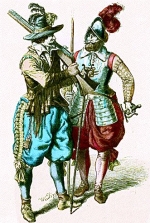|
[From the diary of Captain Rudolf von Goisern]
The Feast Day of Saint Philip and Saint James, the Year of Our Lord Sixteen-hundred and thirty-nine.
This war has been waged for twenty-one years now. I have fought but eight of the years, yet I am heartily sick of it. Yesterday was one of the worst days I have seen, for all that we fought no battles.
I ordered our train stop at the village, although the engine had wood and water aplenty. My troops needed food and foraging has become hard these last few years. Behind the village lay a castle, seemingly unravaged. There was hope that these people would have provender to spare.
A sergeant, my manservant and three musketeers came with me. The remainder of the company remained with the train. We came in peace, to buy and not to pillage.
I hailed the first peasants I saw, a pair toiling in the fields. I asked the old man whose castle it was. He said it belonged to the Baron Krumbach. Was the Baron at home I asked? The man told me nay, the Baron and all his household had ridden to war three summers ago and were yet to return.
I appraised the castle. It must have had storerooms and pantries aplenty. Had the food been taken? Again the peasant said nay, none of the villagers would dare touch what was the Baron's. Their lord had been placed over them because he was strong and they were weak. That was fit and proper. What belongs to the rich and powerful the rich and powerful should keep. What belonged to the poor was theirs, unless the rich had greater need. Which was also fit and proper. The Baron was a great man, the only greater was the Emperor in Vienna.
Now I am as loyal a servant of the Emperor as any. Even the Bohemian Protestants in my company are loyal to the Emperor and to his schilling. Yet the look of love and awe in this man's eyes when he spoke of his Baron were like unto a Dominican preacher telling of Christ's wounds.
I paused for thought. If they have not raided their lord's storehouse then they must not be driven by hunger. They must have their own food aplenty, for all that their appearance was mean and shabby. I asked about such.
The woman became agitated. We only have poor, local food, she cried, for local people. It is not fit for the likes of you!
I smiled. She saw me as a lordly noble. Little could she imagine that my men and I had been reduced to eating horsemeat and weevil infested zwieback. I insisted on seeing some of their poor, local food.
We were led to a meager hut. There was a large iron cookpot on the heath, half-filled with some rich smelling stew. I peered inside. Emerging from the stew was what was unmistakably a human thigh-bone. Whence came you this meat, I inquired.
The man said it was from a young lad of the village. He was too simple to work, too simple to join the army. He could not contribute to the village so he could not eat. It would be cruel to watch him slowly starve and a waste of good meat besides.
Were there others like him? Oh yes, said the woman. The Stumptners had an old granny, blind and useless. And the Brauns, well it was going to be years before they could put that baby to work.
I had my men assemble all the villagers on the green. They were put to the question. Had all engaged in the grisly feasts? Nearly all had.
We hung the bodies by the railroad station, with a sign painted below that all who passed could read and mark. "CANNIBALS. They loved their own weal more than the lives of their fellow men."
There hung all the peasants. All save two. A couple of the faith of the Patriarchs of old, who lived apart from the rest of the villagers. They had vowed to starve rather than join in murder and the consumption of unclean meat. Their sign read "Christ killers."
[To be continued]
| 
